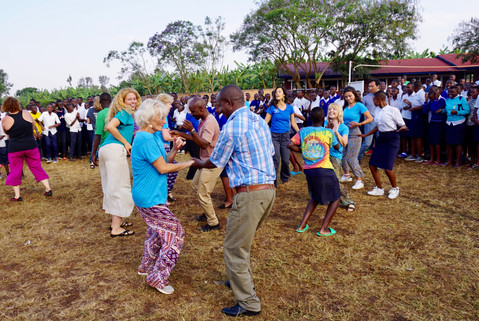Day 11: Inyabutatusabana & Twisungane Cooperatives - and Nyamirama School!
- World Dance for Humanity

- Aug 9, 2019
- 5 min read
Updated: Aug 21, 2019
Friday, August 9th - Kayonza, Rwanda
Written by Don Jack, WD4H Advisor
Why are we here?
It’s Friday morning and we are sitting on the grass in a sloping meadow situated next to a plantation of eucalyptus saplings. We are a short distance outside of Kayonza and our group of about 18 people has joined with a similar number of members from the Inyabutatusabana Cooperative (part of Never Again Fellowship) to walk a few hundred yards down a trail from the highway to the clearing where we are now sitting in a circle. While the original plan was to have us help to cut weeds in the clearing with machetes a more prudent plan has resulted in having us just sit and converse. John, the cooperative president, explains that the name of the co-op means “3 Peoples Unite” in the Kinyarwanda language. It is reminder of the the fact that the Never Again co-ops we have visited are composed of both perpetrators and survivors of the 1994 genocide in which approximately 1,000,000 individual Rwandans died in 100 days.
As the leader of the co-op begins to speak of the genocide we grow solemn. It is a recounting that we have heard before at other co-ops supported by World Dance for Humanity, but every time the remembrances of that time are told it is painful, both for those of us who have come from so far away and more profoundly for the people with whom we sit who have lived those experiences. The Canadian physician James Orbinski was one of the few foreign aid workers who was present in Rwanda during the genocide. In his book An Imperfect Offering, the recounting of what he personally witnessed is horrific. Two of the themes of that book are the imperative for us as human beings to do something when we see our fellow humans in need of help and the recognition that the help that is offered is not perfect. He also emphasizes the need for those being helped to be active participants in the process. So here we are, sitting in a loose circle on this grassy slope.
Why are we here?
A few days ago, on the bus late in the day after visiting some of the cooperatives, Sangwon and I were discussing the concept of Kaizen, or continuous improvement, that has been increasingly embraced by a variety of organizations in the developed world. In Kaizen theory there is the concept of Gemba Kaizen, which is essentially the idea that if you want to improve something it is necessary to go to Gemba, the place where the work is actually done, to understand how improvements can be made. On this Friday morning, sitting next to the eucalyptus plantation filled with slender eucalyptus trees, most no larger than four inches in diameter, the leader tells us about this 7 ½ acre parcel that the co-op received from the government of Rwanda. With many of the co-op members too old to actively participate in conventional farming, they have chosen to raise this crop of tall, fast growing trees. The trees, which are mature enough to harvest after two years, are coppiced from the root stock and then sold for firewood and for construction. During our time sitting on the side of the hill we ask many questions and receive many answers. In our quest to help this community become stronger we have come to this uniquely Rwandan Gemba to see where the work is done and to learn.
Why are we here?
Over and over again during this all-too-brief stay in Rwanda we have had a chance to connect with our hosts on a human level. We have had the slightest glimpse into the pain of the past and have also seen abundant optimism for the future. At every one of our visits to the co-ops we have been greeted with hugs and handshakes. Our nascent, awkward efforts to communicate in the Kinyarwanda language have been met with kindness and we have shared the joy of dancing, using a language that brings us together without words. We are the representatives of a much, much larger group of supporters who make the activities in Rwanda possible. We thank all of them and hope that we are adequate in our represention of them.
Why are we here?
Our time on this planet is so brief and there is so much to experience in the world. In those quiet moments of contemplation we can ask ourselves about what we want to accomplish during this gift of time and what our obligation is to those in need around us. Why are we here?
~
Written by Genevieve Feiner, WD4H Team Member
After our profound exchange with Inyabutatusabana, we drove a little ways to meet with the Twisungane ("Supporting Each Other") Cooperative. We met the women leaders at a co-op member's house, where we would get to see their new pig farm, a long time dream of theirs, which was funded last year by the P&G Alumni Foundation. The pig "pen" is a raised structure, constructed with real lumber (as opposed to scrap wood that most things are made of in the rural areas). Fitted with an aluminum roof, a rain gutter will soon be attached to help sequester drinking water during the rainy season.
The pen is home to four big beautiful pigs: 1 male, and 3 very pregnant females. We squealed (pun intended) in delight as the pigs moved about their pens, some sticking their snouts between the wood to greet us. Once the babies are born, Twisungane will be able to sell some for a profit, and expand their breeding business. The manure from these pigs will help fertilize the co-op's permagardens - but most importantly, they give these women the dignity of being true farmers.
After a brief gathering, while carefully keeping an eye on the approaching rain, we delivered student letters and received a beautiful gift of beans - a sign of their prosperous farming efforts.
We bid farewell and headed to our last stop of the day: Nyamirama Secondary School!
Nyamirama is the sister school of San Marcos High School in Santa Barbara. The students exchange letters throughout the year, and last year we brought Nyamirama laptops as a gift from San Marcos.
We were invited to observe ongoing classes when we arrived, and Professor Sangwon Suh was given the chance to speak to one group of students about the importance of science. In one of the most poignant, brilliant mini-lectures we've heard, he left these bright-eyed, somewhat shy, students with the notion that you do not need to be a scientist to think scientifically. He introduced the concept of dogma, something entirely new to them. Sangwon encouraged the kids to ask questions, look for evidence, don't just believe things because you are told to do so.
Grant also had the chance to address the students, telling his story and inspiring them to overcome what can sometimes be your biggest obstacle: your own self-doubt.
We ended the visit (as always) with a wicked school-wide dance party, full of Queen, Michael Jackson, and all the popular Rwandan hip hop songs. Even the headmaster joined in!
It was great fun ~ now, it was time to drive back to Kigali for the last leg of this life-changing journey.








































































Comments